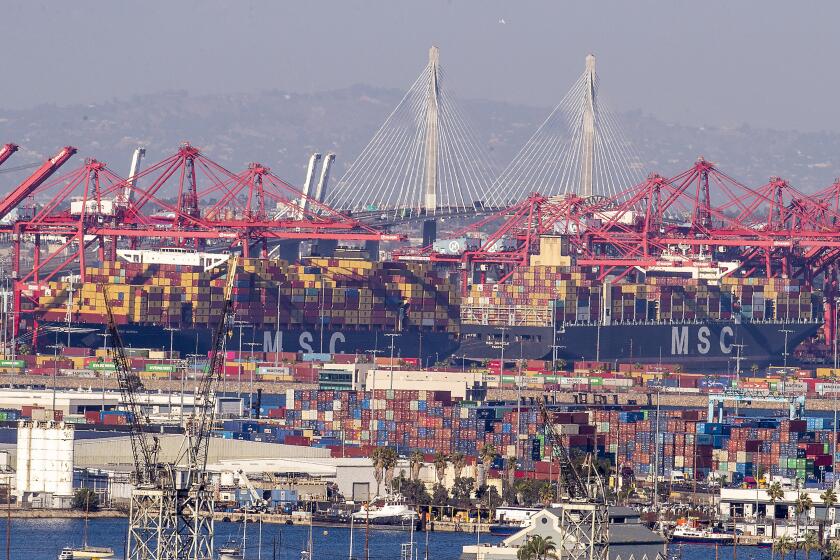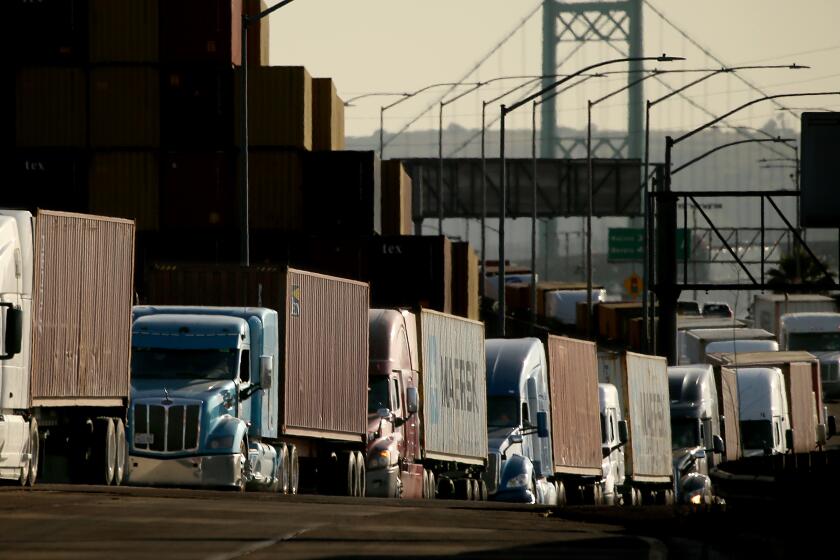L.A., Long Beach port delays expected to end with possible union deal. Why consumers should care

The Los Angeles and Long Beach port docks were humming Thursday after the longshore workers union and employers reached a possible labor deal after months of increasingly contentious talks.
The International Longshore and Warehouse Union and the Pacific Maritime Assn., which represents shipping lines and terminal operators, said late Wednesday that they had tentatively agreed to a new six-year contract covering 22,000 workers at 29 West Coast ports. The two sides didn’t release any details of the deal, which is subject to ratification by union locals and employers.
Union members have been working without a contract since early July. As the high-stakes negotiations dragged on for months, agreements were reached over benefits and the thorny issue of automation, but the union and employers remained far apart on wages.
The two sides finally agreed to a 32% wage increase through 2028 and a one-time pandemic “hero bonus” of $70 million, the Wall Street Journal reported, citing anonymous sources familiar with the negotiations. The proposed pay hike consists of a $4.62 hourly raise the first year of the contract followed by $2 hourly raises each subsequent year, the newspaper said.
Under the expired contract, union members earned an average of nearly $195,000 a year, not including overtime and bonuses, plus benefits worth an average of $102,000 a worker per year, including healthcare that is fully paid by employers, according to the Pacific Maritime Assn.
Retailers, manufacturers and other importers and exporters had called on President Biden to intervene in the negotiations because of repeated port disruptions caused by what employers claimed were deliberate labor actions. The union has denied that it ordered actions, blaming labor shortages on fed-up workers taking matters into their own hands.
Biden last week sent acting Labor Secretary Julie Su to San Francisco to meet with the negotiators, and both sides gave her credit for brokering the tentative deal. Biden in a statement also hailed Su’s role, adding that the agreement showed “once again that collective bargaining — though sometimes difficult — works.”
Retailers and manufacturers have shifted cargo away from the L.A. and Long Beach ports, threatening local jobs. The ports vow to bring that trade back, but it won’t be easy.
The urgent tone from merchants and others — the National Retail Federation trade group issued a statement Thursday expressing its relief and urging quick ratification — underscores how important the ports are as an economic engine and a key link in getting goods to store shelves and consumers’ doors. The pandemic shipping bonanza brought huge financial gains to ocean shipping lines but also created enormous congestion at the Los Angeles and Long Beach ports, creating a where’s-my-stuff malaise among consumers and corporate customers.
“The United States ports, particularly those on the West Coast, play a critical role in the vitality of the American economy. Thousands of retailers and other businesses depend on smooth and efficient operations at the ports to deliver goods to consumers every day,” David French, the trade group’s senior vice president of government relations, said last week.
“As we enter the peak shipping season for the holidays, these additional disruptions will force retailers and other important shipping partners to continue to shift cargo away from the West Coast ports until a new labor contract is established,” he said.
The U.S. Chamber of Commerce said a serious work stoppage at the ports of Los Angeles and Long Beach could cost the U.S. economy nearly $500,000 a day and a strike at all 29 West Coast harbors could cost about $1 billion a day.
The Los Angeles and Long Beach ports handle nearly 40% of U.S. imports from Asia, and they have lost market share during the contract negotiations as some shippers sent cargo through East and Gulf coast ports.
The ILWU, the union representing dockworkers across the West Coast, is at the bargaining table with the PMA, the group representing shipping companies. The current contract expires on July 1.
That matters because of the large amount of economic activity and the number of jobs that depend on smooth port operations in Southern California and other port regions.
In Los Angeles, the ports support 1 in 15 jobs, Mayor Karen Bass said in a statement in which she hailed the agreement as “a win for the working people of our city.”
The twin ports’ economic effects extend far beyond the people who work there, reaching truckers, warehouse workers and those who are employed by the vast industry supporting the international supply chain. In addition, those workers spend money in the regional economy, producing income for a broad range of businesses.
An estimated 175,000 Southern California workers — employed at the harbors themselves as well as in related businesses — move freight valued at $469 billion a year, port data show.
International labor economist Jock O’Connell of Beacon Economics called the proposed deal “a very positive sign for the West Coast ports and for everyone who sends their cargo through them.”
“The reputation of the West Coast ports as reliable conduits for Asian trade will be less tarnished, but they still have a long way to go in assuring shippers and customers, the importers and exporters,” in the wake of recent disruptions that caused significant delays in the movement of goods, he said.
Southern California dockworkers disrupted the Los Angeles and Long Beach ports Friday after contract talks deteriorated in recent days.
The Pacific Maritime Assn. has accused the union of labor actions including failing to send enough workers and directing union members to take meal breaks at the same time instead of staggering breaks. The union has countered that its members are working diligently to move goods.
In April, the port complex shut down for about 24 hours because of a worker shortage; the labor union said individual members had gone to a union meeting or were observing Good Friday, as allowed under the contract. Last month, labor shortages disrupted operations at Los Angeles and Long Beach and caused the Oakland port to shut down for a time. The Seattle port has been closed in recent days because of the labor strife.
The lost freight represents a serious blow to the Southern California economy if that business doesn’t return.
The proposed deal “will enhance the ability of ports along the West Coast to attract more shipping that had been diverted to ports along the Atlantic and Gulf Coast ports,” O’Connell said. “Goods will more expeditiously arrive at their destinations.
“And to the extent that it does enhance the cargo flows through the ports, it means more job opportunities for everyone involved along the supply chain.”
Consumers have trouble grasping why port delays are important, said Jonathan Gold, vice president of supply chain and customs policy at the National Retail Federation.
“Delays affect the ability to get goods to market, whether they are finished goods for retailers or materials for manufacturers, they will have just three to five days worth of inventory on hand,” Gold said.
“If they can’t get what they need on time, that has an impact on the manufacturing process. For [agricultural] exporters who have a limited amount of time to get their goods to market, if their cargo can’t get loaded and depart, there’s the potential of them losing the sale,” he said.
The tentative agreement “brings the stability and confidence that customers have been seeking,” said Gene Seroka, executive director of the Port of Los Angeles, the nation’s largest cargo container port. “We look forward to collaborating with our partners in a renewed effort to bring back cargo and demonstrate why Los Angeles is the first choice for trans-Pacific trade.”
The East and Gulf coast ports that have benefited from the West Coast labor strike are in the middle of early negotiations for a contract with the International Longshoremen’s Assn. to replace the contract that expires in September 2024.
Times staff writer Christian Martinez contributed to this report.
More to Read
Inside the business of entertainment
The Wide Shot brings you news, analysis and insights on everything from streaming wars to production — and what it all means for the future.
You may occasionally receive promotional content from the Los Angeles Times.













